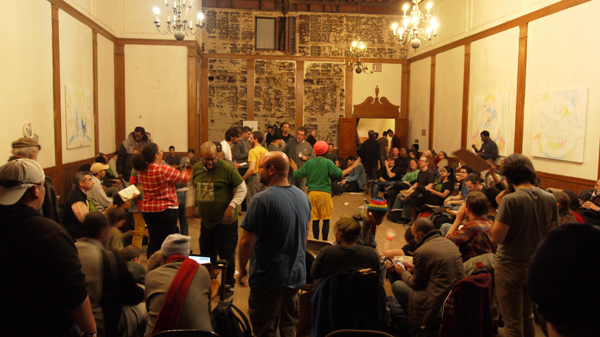
The situation within the housing working group reflects concerns expressed by occupiers throughout the movement that group facilitators and others who oversee resources are excercising improper authority over other members of the movement. Personal connections go a long way in acquiring resources from the movement such as housing, food and transportation, according to Leslie Napper, a student from Maryland who came to New York City to join the movement.
Zachary Williams, a student from Los Angeles (no relation to this reporter) said it has especially been difficult to acquire free Metrocards in order to attend Occupy Wall Street events.
“People feel powerful so they can be rude to you; they can treat you a certain way and they think that they can get away with it because they are holding the cards,” said Williams.
Tonye Iketubosi, who was charged with allegedly raping a woman in Zuccotti Park months ago according to media reports, was allowed to spend several nights in a church earlier this month where his alleged victim was also staying. Conflicting accounts of the situation center around whether two housing organizers, Jason Harris and Jeffrey Brewer knew about his identity before others brought it to their attention.
This happened on the final night that occupiers rented space at Saint Paul’s and Saint Andrew’s Church on West 86th Street and resulted in an impromptu meeting attended by about 30 people, according to Brewer. The group ultimately allowed Iketubosi to remain in the church for the night although he was confined to a separate room with four other men, said Brewer.
Harris could not be reached for comment by press time.
Brewer noted the discussion that night concerned Iketubosi’s housing needs rather than the alleged incident at Zuccotti Park, where demonstrators staged an encampment for nearly two months. Contrary to media reports stating that Iketubosi is from Crown Heights, Brooklyn, Brewer said that he was under the impression that Iketubosi was not from New York City and had no housing options other than the church.
He said that up until that time he was unaware that an alleged rapist was present at the church.
“It was 12:15 [a.m.] when it was brought to our attention. He had been staying in the church for two or three days. No one had said anything to us previously about it or the group at large that we knew of,” said Brewer. “So we had a real issue of what do we do with this individual in the middle of the night when he didn’t have anywhere else to stay.”
Brewer’s response aroused as much controversy as the presence of Iketubosi, especially from activists representing groups historically discriminated against including women, racial minorities and members of the LGBT community. At a Spokes Council meeting last Friday members of such communities said that Brewer and Harris had ignored their concerns regarding safety within “Occupy housing” and had exhibited sexist attitudes. Both men denied the accusations.
A petition has been circulated among occupiers calling for the ouster of Brewer and Harris as liaisons to the churches and has gathered roughly two-dozen signatures. Supporters of the petition said that the two men improperly dominate housing for the movement. Brewer responded Monday by stating the effort was the result of “personal politics”.
When a proposal for $3,680 in funding for housing came before the Spokes Council last week, members of the Women Occupying Wall Street caucus blocked the proposal in order to focus attention on safety concerns important to the caucus that they said the two men had yet to address. The proposal ultimately passed after the two sides agreed to pursue mediation.
“There were some individuals who we had really strong safety concerns about [and] we also wanted to make sure that those individuals would not be allowed to come into this space,” said Christine, a member of the caucus and accounting working group who declined to give her last name but said she was originally from North Carolina.
Discussions of “occupying” the council by women in lingerie or by erecting symbolic tents are ongoing as an effort to address the purported influence of certain activists over others, said Nan Terrie who is a member of the strong women rules working group.
Brewer and Harris have been active in arranging housing for homeless occupiers at local churches. But these efforts have transformed into a form of personal power that does not acknowledge other voices within the housing working group, according to Sean McKeown who said he was among those who forced Iketubosi to leave Zuccotti Park following the alleged rape. While he acknowledged that Brewer had done much to improve housing for occupiers, McKeown said Brewer has been degrading to other activists.
“There is not an elite [within the movement]. There are however people who have made fiefdoms,” said McKeown. “They have something they’re doing; it’s their pet project.”
McKeown added that similar issues in other working groups had been resolved internally.
Ideals are ultimately what unify the movement despite the challenges inherent in trying to internally realize them, according to filmmaker Michael Moore who said he regularly attends working group and general assembly meetings. After a contentious Spokes Council meeting last Wednesday, organizers invited him to speak.
The values of the movement are resonating with the American people as evidenced by recent polls, Moore said to the crowd. Difficulties in resolving differences among activists must be kept in perspective considering that all are involved in a common cause aimed at dramatically undermining corporate influence within the political, economic and cultural spheres, he added.
“We all have to be foot-soldiers in a non-violent army for all of this to take place,” Moore said in an interview. “We have to see ourselves as the French Resistance … this is not playtime for me.”

































